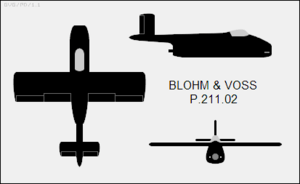Blohm & Voss P.211
| P.211 | |
|---|---|
 | |
| BV P.211.02 | |
| Role | Fighter |
| Manufacturer | Blohm & Voss |
| Primary user | Luftwaffe |
| Number built | None completed |
| Developed from | BV P.210 |
The Blohm & Voss P.211 was a design proposal submitted by Blohm & Voss to the Volksjäger jet fighter competition of the Luftwaffe Emergency Fighter Program towards the end of the Third Reich in the Second World War.[1]
History
This plane is one of the products of the latter part of 1944, when the High Command of the Luftwaffe saw that there was a dire need to put up a strong defense against the devastating allied bombing raids. Thus aircraft manufacturers Messerschmitt, Arado, Focke-Wulf, Heinkel, Junkers and Blohm & Voss were asked by the Luftwaffe on September 8 to come up with light fighter designs weighing no more than 2000 kg that would use one BMW 003 jet engine per unit.
Owing to the war-related scarcity of strategic materials such as aluminum, the fighter jets were required to be simplified in order to be built using a strict minimum, as well as to be built in adequate quantities as quickly as possible in underground factories. Despite these requirements that would impinge on the overall quality of the new planes, their performance was required to surpass that of the best piston-engined fighters, being able to reach a maximum speed of 750 km/h with a minimum combat action time of 30 minutes.[2]
Variants
BV P.211.01
A model based on the BV P.210 project[3] with a highly innovative low swept wing[4] that was developed by Hans Amtmann. The single BMW 003A-1 engine was placed under the tail. Although it had great aerodynamic properties and was praised by officials, it did not go into production.[5]
BV P.211.02
The Blohm & Voss P.211.02 was almost identical to the P.211.01 but, since low cost was important, it had a simpler constant chord wing. The wing was placed in the shoulder position, slightly below the top of the fuselage. The P.211.02 was designed by Richard Vogt and included wood in its construction. Parts of the plane were built, such as the steel air-intake/fuselage load-bearing structure for the single BMW 003A-1 engine. However, the P.211.02 didn't go past the project stage for the project was finally awarded to Heinkel whose He 162 Spatz went into mass-production.[6]
See also
References
- ↑ Mr A I Bruce. "Blohm & Voss operated Hamburger Flugzeugbau aircraft company". Wehrmacht-history.com. Retrieved 2010-06-07.
- ↑ "Blohm & Voss BV P.211 Luft '46 entry". Luft46.com. Retrieved 2013-05-01.
- ↑ Blohm & Voss BV P.210 Luft '46 Entry
- ↑ The Heinkel He-162 Volksjaeger
- ↑ Blohm & Voss BV P.211.01 Luft '46 Entry
- ↑ Ulrich Albrecht: Artefakte des Fanatismus; Technik und nationalsozialistische Ideologie in der Endphase des Dritten Reiches (in German)
External links
| Wikimedia Commons has media related to Blohm & Voss P.211. |